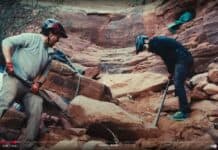
As things begin to slowly reopen and student athletes and their teams now shift their attention to summer workouts and practices, the Arizona Interscholastic Association has released a set of recommended guidelines detailing steps for everyone to follow to help prevent the spread of COVID-19.
The guidelines were written by members of the Sport Medical Advisory Committee. It was noted that the guidelines should be treated as a “living document” that can and will be amended as time goes by.
“Our priority through this is for the safety and well-being of all our state’s student-athletes and those that support them,” AIA Executive Director David Hines said in a statement. “We are not guaranteed to have a fall season. We are preparing to be ready on time, but it will all depend on how this situation develops as the summer goes on. We just ask that schools, coaches, players and parents consider and utilize the guidelines until we get back to normal.”
Anyone feeling ill is encouraged to stay home. People are also encouraged
to wash their hands, not spit, cover their mouths while sneezing or coughing, shower as soon as they get home and put their clothes in a place so people who live under the same roof won’t come into contact with them.
Athletes and coaches are also encouraged to continue to not touch their faces, avoid contact with others [even in the case of normally common occurrences
like high fives or fist bumps] and are “strongly encouraged” to cover their faces. It is also recommended that athletes have an adequate supply of soap, hand sanitizer, paper towels and tissues.
At practices and workouts, people are asked to remain six feet apart from each other, leave immediately after practice and not share items like drinking fountains. Additionally, athletes are encouraged to bring their own balls. As AIA Sports Information Coordinator Seth Polansky noted, most early practices won’t require situations where teammates would be encouraged to use a common ball.
“Early return workouts should be individual drills, conditioning, acclimatization,
etc.,” Polansky said. “So, as part of the early return phase, if a player feels it necessary to bring their own ball, it should be part of an individual drill. Like the volleyball player hitting a ball against a wall or practicing setting on their own, or the football quarterback throwing the ball into the net.”
“These early return guidelines aren’t for the receiver catching the ball from someone or the back line player digging a kill attempt,” he added. “The early focus should be retraining for conditioning. Down the road when guidelines
dictate that teammates can share balls, then it’ll happen. Our SMAC will be revisiting return to play as we go through the summer and may come up with more recommendations down the road.”
The AIA will continue to monitor the situation as the summer progresses and the status of a potential fall sports season gets more clear.
The guidelines added that while a return to sports and physical activity is important, it’s also important to stay vigilant and healthy.
“The Centers for Disease Control recognizes the benefits of physical activity particularly in this time of the COVID-19 pandemic,” the guidelines statement said. “The challenge is to reintroduce physical activity in a manner that follows federal, state and county public health guidelines to reduce the spread of illness amongst athletes, coaches, athletic training staff and the community.”
Further information can be found at aiaonline.org.




















